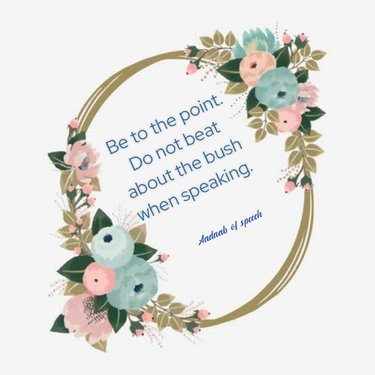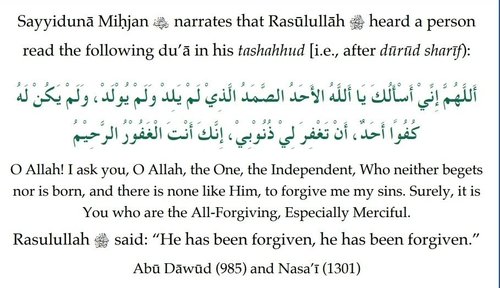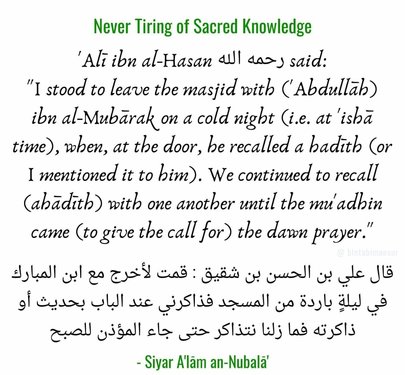-
Posts
1,761 -
Joined
-
Last visited
-
Days Won
106
Content Type
Profiles
Forums
Events
Everything posted by Bint e Aisha
-

Aadaab (Etiquettes) of Speech
Bint e Aisha replied to Bint e Aisha's topic in Inspiring Quotes & Poems
-

Aadaab (Etiquettes) of Speech
Bint e Aisha replied to Bint e Aisha's topic in Inspiring Quotes & Poems
-

Aadaab (Etiquettes) of Speech
Bint e Aisha replied to Bint e Aisha's topic in Inspiring Quotes & Poems
-
﷽ A cure for praises A spiritual student (murid) wrote: When some one praises me in front of me, I have contradictory feelings in my heart about it. I like it and at the same time I stop those praising me to not praise me. Please guide me on how I should handle this correctly. Jazaak Allah Hadhrat Mufti Taqi Usmani sahib (Hafizahullah) replied: “Spontaneous natural happiness is not detrimental. On these occasions contemplate that, all praise is due to Allah SWT, He made them see my good state. If they were to know of my reality they would have hated me.” (Meraj us Salikeen)
-
-
-
"Reflect over the favours of Allah Ta`ala, both material and spiritual. The more you will reflect the more you will discover Allah's love." And Allah Ta`ala knows best (Mufti) E Salejee Source
-
بسم الله الرحمن الرحيم Thursday Majlis | Mufti Ebrahim Desai Saheb 1) Mutual interaction on Social Media, a new form of gangsterism 2) Do not attack anyones dignity and honour 3) Propagate Haqq according to the Sunnah DOWNLOAD Spiritual Advices of Mufti Ebrahim Desai Darul Mahmood | darulmahmood.net
-
- 36 replies
-
- inspiration
- motivation
-
(and 1 more)
Tagged with:
-
الْمُحْيِي الْمُمِيتُ الْمُحْيِي and الْمُمِيتُ will be discussed together Translations الْمُحْيِي is translated as The Giver of Life and The Reviver and الْمُمِيتُ is translated as The Taker of Life and The Creator of Death. Definitions الْمُحْيِي is that Being Who gives life to a dead drop (i.e. to a lifeless form but with potential of life) of impure water. He nurtures and brings forth from it a life form and then it is that Being Who will bring back to life all bodies on the Day of Judgment. Therefore Allah ta’ala is الْمُحْيِي, bringing life from non-existence and then again on the Day of Judgment, Allah ta’ala will be الْمُحْيِي when He brings people back to life. الْمُمِيتُ is that being Who gives death to the living. Through the power of Allah ta’ala all of creation is born and all matters return back to Him. None is alive and no one dies except through what He wants. No one can increase or decrease anyone’s age except through His decree. Life & Death only by Allah ta’ala’s Decree Doctors often say to a person who for instance a person aged 70 who has had a heart surgery, that he/she is fit and will live another 20 years as they now have a healthy heart however he/she may die within two years of cancer. No doctor can determine a life. Only Allah ta’ala can. Fir’awn wanted Musaa AS dead however Allah ta’ala inspired his mother to put him in a basket in a flowing river and it was Fir’awn’s wife who wanted to take the baby in and look after him. If Allah ta’ala wanted someone to live longer He will create the means for it just as Musaa AS grew up in the very house of the person who wanted him dead. Namrood claimed divinity and his dialogue is recounted in verse 258 of Surah Baqarah; أَلَمْ تَرَ إِلَى الَّذِي حَاجَّ إِبْرَاهِيمَ فِي رَبِّهِ أَنْ آتَاهُ اللَّهُ الْمُلْكَ إِذْ قَالَ إِبْرَاهِيمُ رَبِّيَ الَّذِي يُحْيِي وَيُمِيتُ قَالَ أَنَا أُحْيِي وَأُمِيتُ ۖ قَالَ إِبْرَاهِيمُ فَإِنَّ اللَّهَ يَأْتِي بِالشَّمْسِ مِنَ الْمَشْرِقِ فَأْتِ بِهَا مِنَ الْمَغْرِبِ فَبُهِتَ الَّذِي كَفَرَ ۗ وَاللَّهُ لَا يَهْدِي الْقَوْمَ الظَّالِمِينَ “Have you ever reflected upon the one (Namrud), to whom Allah had given him kingdom, who argued with Ibrahim (Abraham) about his Rabb. When Ibrahim said: “My Rabb is He Who has power to give life and to cause death.” He replied: “I too have the power to give life and to cause death.” Ibrahim said, “Well, Allah causes the sun to rise from the east; just make it rise from the west.” Thus the unbeliever was confounded; Allah does not guide the evildoers.” Namrood demonstrated that he too can give life and death by setting free a person who was to die and giving death to another person. When Ibraheem AS replied that Allah ta’ala causes the sun to rise from the east; just make it rise from the west, Namrood was left speechless. Khalid bin Waleed RA was known as “Sayfullah” – the sword of Allah.. On his deathbed he said, “I have participated in so-and-so number of battles. There is not a part of my body, but suffered a shot (of an arrow), a stab (of a spear) or a strike (of a sword). Yet, here I am, I die on my bed just as the camel dies! May the eyes of the cowards never taste sleep.” He was the commander of the Muslim army, a brave warrior who wanted to die as a martyr on the battlefield however he did not realise that he was the “Sword of Allah” and could not be killed by the sword of a disbeliever. Allah ta’ala gives death as He wants and when He wants and not how a person may want it. Sometimes we see people who never leave home and then they travel for Umrah and die in Madeenah and are buried in Jannatul Baqee and others who are always travelling to Hajj and Umrah and hope to die there, die at home. The Story of the Boy and the King (from Surah Burooj) Imam Ahmad recorded from Suhayb that the Messenger of Allah said: Among the people who came before you, there was a king who had a sorcerer, and when that sorcerer became old, he said to the king, "I have become old and my time is nearly over, so please send me a boy whom I can teach magic.'' So, he sent him a boy and the sorcerer taught him magic. Whenever the boy went to the sorcerer, he sat with a monk who was on the way and listened to his speech and admired them. So, when he went to the sorcerer, he passed by the monk and sat there with him; and on visiting the sorcerer the latter would thrash him. So, the boy complained about this to the monk. The monk said to him, "Whenever you are afraid of the sorcerer, say to him: `My people kept me busy.' And whenever you are afraid of your people, say to them: `The sorcerer kept me busy.''' So the boy carried on like that (for some time). Then a huge terrible creature appeared on the road and the people were unable to pass by. The boy said, "Today I shall know whether the sorcerer is better or the monk is better.'' So, he took a stone and said, "O Allah! If the deeds and actions of the monk are liked by You better than those of the sorcerer, then kill this creature so that the people can cross (the road).'' Then he struck it with a stone killing it and the people passed by on the road. The boy came to the monk and informed him about it. The monk said to him, "O my son! Today you are better than I, and you have achieved what I see! You will be put to trial. And in case you are put to trial, do not inform (them) about me. ''The boy used to treat the people suffering from congenital blindness, leprosy, and other diseases. There was a courtier of the king who had become blind and he heard about the boy. He came and brought a number of gifts for the boy and said, "All these gifts are for you on the condition that you cure me.'' The boy said, "I do not cure anybody; it is only Allah who cures people. So, if you believe in Allah and supplicate to Him, He will cure you.'' So, he believed in and supplicated to Allah, and Allah cured him. Later, the courtier came to the king and sat at the place where he used to sit before. The king said, "Who gave you back your sight'' The courtier replied, "My Lord.'' The king then said, "I did'' The courtier said, "No, my Lord and your Lord - Allah'' The king said, "Do you have another Lord beside me'' The courtier said, "Yes, your Lord and my Lord is Allah.'' The king tortured him and did not stop until he told him about the boy. So, the boy was brought to the king and he said to him, "O boy! Has your magic reached to the extent that you cure congenital blindness, leprosy and other diseases'' He said, " I do not cure anyone. Only Allah can cure.'' The king said, "Me'' The boy replied, "No.'' The king asked, "Do you have another Lord besides me'' The boy answered, " My Lord and your Lord is Allah.'' So, he tortured him also until he told about the monk. Then the monk was brought to him and the king said to him, "Abandon your religion.'' The monk refused and so the king ordered a saw to be brought which was placed in the middle of his head and he fell, sawn in two. Then it was said to the man who used to be blind, "Abandon your religion.'' He refused to do so, and so a saw was brought and placed in the middle of his head and he fell, sawn in two. Then the boy was brought and it was said to him, "Abandon your religion.'' He refused and so the king sent him to the top of such and such mountain with some people. He told the people, "Ascend up the mountain with him till you reach its peak, then see if he abandons his religion; otherwise throw him from the top.'' They took him and when they ascended to the top, he said, " O Allah! Save me from them by any means that You wish.'' So, the mountain shook and they all fell down and the boy came back walking to the king. The king said, "What did your companions (the people I sent with you) do'' The boy said, "Allah saved me from them.'' So, the king ordered some people to take the boy on a boat to the middle of the sea, saying, "If he renounces his religion (well and good), but if he refuses, drown him.'' So, they took him out to sea and he said, "O Allah! Save me from them by any means that you wish.'' So they were all drowned in the sea. Then the boy returned to the king and the king said, "What did your companions do'' The boy replied, "Allah, saved me from them.'' Then he said to the king, "You will not be able to kill me until you do as I order you. And if you do as I order you, you will be able to kill me.'' The king asked, "And what is that'' The boy said, "Gather the people in one elevated place and tie me to the trunk of a tree; then take an arrow from my quiver and say: `In the Name of Allah, the Lord of the boy.' If you do this, you will be able to kill me.'' So he did this, and placing an arrow in the bow, he shot it, saying, "In the Name of Allah, the Lord of the boy.'' The arrow hit the boy in the temple, and the boy placed his hand over the arrow wound and died. The people proclaimed, "We believe in the Lord of the boy!'’ Then it was said to the king, "Do you see what has happened That which you feared has taken place. By Allah, all the people have believed (in the Lord of the boy).''So he ordered that ditches be dug at the entrances to the roads and it was done, and fires were kindled in them. Then the king said, "Whoever abandons his religion, let him go, and whoever does not, throw him into the fire.'' They were struggling and scuffling in the fire, until a woman and her baby whom she was breast feeding came and it was as if she was being somewhat hesitant of falling into the fire, so her baby said to her, "Be patient mother! For verily, you are following the truth!'') Counsel To have Yaqeen that it is Allah ta’ala Who gives life and death despite people’s strategies and conspiracies or black magic (there is Haqeeqat in black magic but it does not work without the will of Allah ta’ala). Masnoon Du’a before Sleeping & upon Awakening اللَّهُمَّ بِاسْـمِكَ أَمُوتُ وَأَحْيَا In Your name O Allah, I live and die. الحَمْدُ لِلهِ الَّذِي أَحْيَانَا بَعْدَ مَا أَمَاتَنَا وَإِلَيْهِ النُّشُورُ All praise is due to Allah, Who has brought us back to life after He has caused us to die, and to Him is the return. These Du’a reminds us that it is Allah ta’ala Who grants life and death. Death is a type of sleep and when we awaken from it will be the Day of Judgment. We should make Du’a for Husn-e-Khaatimah. *~~*~~*
-
الْمُبْدِئُ الْمُعِيدُ الْمُبْدِئُ and الْمُعِيدُ will be discussed together Translations & Definitions الْمُبْدِئُ is translated as The Originator and The Starter. This word comes from بدع meaning to begin. It means coming out of non-existence so مُبْدِئُ is and Ism Faa’il and الْمُبْدِئُ is The One Who brings into existence that which was non-existent and that Being can only be Allah ta’ala as only He can bring something out of nothing. In our case we need raw materials to bring something into existence. الْمُعِيدُ is translated as The Restorer and The Renewer. الْمُعِيدُ is that Being Who brings back creation from life towards death. مُبْدِئ means to bring something to life and مُعِيد literally means bringing back. Therefore it means taking back from the life of this world, bringing it toward death and then from death, bringing it to life again in the afterworld. Another explanation of الْمُعِيدُ is to bring back all of creation even though the physical bodies have decomposed. مُبْدِئ - To bring something from nothing (i.e. the first time) مُعِيد - To return something that has ceased to exist (i.e. the second time) Every person, Believer or non-believer, atheist etc., accepts we came into existence from non-existence and some day we will return. These are two things no one can deny. That leaves us with the middle stage. We should accept that we were non-existent and came into existence and we will cease to exist and Allah ta’ala wil then bring us back to life and this is where Imaan comes in as everyone accepts the first and last stages. This world is Daarul-amal where we’re supposed to work and the Aakhirah is Daarul-jazaa’ where we will be compensated. We should think that I was nothing and Allah ta’ala is الْمُبْدِئُ and brought me to this world and He is الْمُعِيدُ and I shall have to return to Him. Another way to understand this is that Allah ta’ala brings us into this world in different forms and different circumstances i.e. born into a rich or poor family, male or female etc. and since Allah ta’ala has brought us from non-existence in to different circumstances, we should learn from this that we have to be just to other people. If we are rich then we should be kind and generous to the poor as Allah ta’ala is الْمُعِيدُ and He will return us and question us. The more certainty there is in this name i.e. that I have to return to Allah ta’ala , the more careful one will be about being just in every way. Concept of Resurrection Allah ta’ala mentions two episodes in Surah Baqarah regarding Ibraheem AS and a Prophet of the Bani Isra’eel, Uzair bin Barkhiya AS, both of whom asked Allah ta’ala regarding resurrection (for peace of heart and not due to disbelief.) The first incident in verse 259 - Uzair bin Barkhiya AS The town referred in the verse is Baytul Maqdis and the Bani Isra’eel lived in and around this area. Nebachanezzar (in Arabic Bakht Nasr) had killed and enslaved the Bani Isra’eel and razed Baytul Maqdis. Among them was a Nabi and many commentators have stated that the person mentioned in this verse was the Nabi, Uzair bin Barkhiya AS. He was also enslaved however he managed to secure his release from captivity and he returned to Baytul Maqdis which he found in ruins. In awe he wandered out loud how Allah ta’ala could restore the place to life again. It was innocent wondering and not the doubting of Allah ta’ala’s power. Allah ta’ala caused him to die and remain in the state of death for a hundred years, after which he was brought back to life. Allah ta’ala asked him how long had he remained in this state of death, whereupon he replied that it was for the duration of a day or a part of it. Allah ta’ala corrected his misjudgment, informing him that a hundred years had passed. Despite this long period, Allah ta’ala had preserved his body as if it had been lying there for only a few hours. Thereafter Allah ta’ala demonstrated to him how He reconstructed the decomposed body of his donkey. All its bones were scattered about, but Allah ta’ala collected them together to arrange them properly. Then Allah ta’ala covered these bones in flesh after which it was brought back to life. When it was all completed before his eyes, he said, “I know that Allah is Powerful over everything.” During his 100 years sleep, Bakht Nasr had died and the Bani Isra’eel returned to Baytul Maqdis and inhabited the area once again. This episode occurred to the person in question so that it may serve as a lesson to people after him, so that they believe in the resurrection after death. The second incident in verse 260 –Ibraheem AS This verse mentions Ibraheem AS who sought from Allah ta’ala the favour of being shown as to how He would bring the dead back to life. His question was not a rejection as Ibrahim AS was a firm believer in Tawheed and in the resurrection after death. He was Khaleelullaah and he had Imaan-e-kaamil and Yaqeen-e-kaamil. He posed this question to Allah ta’ala merely to have an eye witness account (Mushaahadah) of Allah ta’ala’s ability to resurrect. Allah ta’ala instructed him to find four birds, tame them and then cut them into pieces. These pieces were to be placed on several hills. Once this was done, he was to call them. This he did, and (instead of flying) they all came running to him, as a display of Allah ta’ala’s power. Some scholars say Ibraheem AS was told to tame / domesticate the birds so that he would recognise the birds. When they come back he should be able to see that these are the same birds. Allah ta’ala says in Surah Ambiyaa, verse 104, يَوْمَ نَطْوِي السَّمَاءَ كَطَيِّ السِّجِلِّ لِلْكُتُبِ ۚ كَمَا بَدَأْنَا أَوَّلَ خَلْقٍ نُعِيدُهُ ۚ وَعْدًا عَلَيْنَا ۚ إِنَّا كُنَّا فَاعِلِينَ On that Day We shall roll up the heavens like a scroll of writings; just as We originated the first creation, so shall We produce it again - that is Our promise, and We will fulfill it. In answer to those who deny the resurrection Allah ta’ala says He will resurrect you how He created you the first time. It is easy to resurrect the second time after the first time. Aishah RA reported that the Prophet sallallaahu ‘alayhi wasallam said, The people will be assembled barefoot, naked, and uncircumcised.” I said, “O Messenger of Allah, will the men and women look at each other?” The Prophet said, “The matter will be too serious for them to notice.” [Bukhari and Muslim] The Mushrikeen would take a bone and ask how Allah ta’ala can resurrect from a bone and even today people have doubts and criticism regarding life after death. This is based on limited power and knowledge of humans but Allah ta’ala is beyond any limitations and His power is perfect. Counsel We should value our worldly life and prepare for the Aakhirah. The more certainty there is of leaving this world and of resurrection and returning to Allah ta’ala, the more a person will value his life. As people get older the certainty of life ending increases and they often begin to value life more. Whatever phase we pass, we will never return to it so do not look back to the mistakes that were made. Look to the future and value the time that is left. People who do not believe in the Aakhirah have no meaning in life and they do not value their lives as for them there is nothing after death. Use in Du’a We should say, O Allah, You are الْمُعِيدُ and I have to return to You. I want to return in the state where You are pleased with me. We shall have to face Allah ta’ala in the Aakhirah so we should not do anything that will make us ashamed to face Him. For sins committed, there is Tawbah which wipes the slate clean. *~~*~~*
-
الْمُحْصِي Translation الْمُحْصِي is translated as The Reckoner and The Appraiser. It comes from Ihsaab and has more of a quantification meaning i.e. it has the concept of enumeration, counting. Allah ta’ala says in the Qur’an, وَإِنْ تَعُدُّوا نِعْمَةَ اللَّهِ لَا تُحْصُوهَا ۗ If you want to count the favours of Allah, you will never be able to number them [Surah Nahl: 18] Definition الْمُحْصِي is that being that knows each separate thing absolutely and knows the limit of each object and its quantity and dimension. In Surah Jinn, verse 28, Allah ta’ala says, وَأَحْصَىٰ كُلَّ شَيْءٍ عَدَدًا - and keeps a count of each and everything Allah ta’ala is that Being Who knows the exact numbers of particles of dirt on the mountains, the number of rain drops that fall, the number of drops of water in the ocean, the number of leaves on the trees. With all the technology in this age scientists give estimations and come up will mind boggling numbers of things in the universe however Allah ta’ala knows the exact number of everything in the universe from the beginning of time till the end. Someone said, “You can find God in the detail” Beautiful Du’a of a Bedouin which includes the Concept of Enumeration Anas RA reports that Rasoolullaah sallallahu ’alayhi wasallam passed by a bedouin while he was supplicating in Salaah and Rasoolullaah sallallaahu ‘alayhi wasallam stopped to listen to him. Thereafter Rasoolullah sallallahu’ alayhi wasallam sent someone to fetch him saying when he finished praying and when he was brought to him Rasoolullah sallallahu ’alayhi wasallam gave him gold which had been given to him as a gift. The Du’a is as follows, يا منْ لاَّ تَرَاهُ العُيُون Yaa Man La Taraahul ‘Uyoon O the one who eyes cannot behold in this world ولا تُخالِطُهُ الظُّنُون Wa Laa Tukhaalituhudh-Dhunoon and minds cannot comprehend His greatness ولا يَصِفُهُ الْوَاصِفُون Wa Laa Yasifuhul Waasifoon and people cannot praise Him as he deserves to be praised ولا تُغَيِّرُهُ الْحَوَادِث Wa Laa Tughayyiruhul Hawaadith and situations do not change him ولا يَخْشَى الدَّوَائِر Wa Laa Yakhshad-Dawaa’ir and he does not fear the passing of time يَعْلَمُ مَثاقِيلَ الْجِبال Ya’lamu Mathaaqeelal Jibaal He knows the exact weight of the mountains وَمَكايِيْلَ الْبِحار Wa Makaa-yeelal Bihaar And the volume of the oceans وَعَدَدَ قَطْرِ الأمْطار Wa Adada Qatril Amtaar And the number of drops of rain وَعَدَدَ وَرَقِ الأشْجار Wa Adada Waraqil Ashjaar And the number of leaves on trees وَعَدَدَ مَا أُظْلِمُ عَلَيْهِ الْلَيْل وَأشْرَقَ عَلَيْهِ النَّهار Wa Adada Maa Udhlima Alayhil Layl. Wa Ashraqa Alayhin-Nahaar And those things that the day illuminates with its light and the night hides in its darkness ولا تُوَارِي مِنْهُ سَمَاءٌ سَمَاءً، وَلا أرْضٌ أرْضَاً Wa Laa Tuwaari Minhu Samaa’un Samaa’, Wa Laa Ardun Ardaa’ And one sky cannot shield another sky, and no ground can shield another layer of ground from Allah وَلا بَحْرٌ مَا فِي قَعْرِهِ Wa Laa Bahrun Maa Fee Qa’rihi And the ocean (in its depths and darkness) cannot hide anything from Allah وَلا جَبَلٌ مَا فِي وَعْرِهِ Wa Laa Jabalun Maa Fee Wa’rihi And a mountain cannot (in its deepest darkest cave) hide anything from Allah اِجْعَلْ خَيْرَ عُمْرِي آخِرَه Make best part of my life the last part of my life وَخَيْرَ أيَّامِي يَوْمَ ألْقَاَكَ فِيْه وَخَيْرَ عَمَلِي خَوَاتِيْمَه and make the best of my action the action that I do in this life and the best day the day I return back to meet You. [Al-Mu’jamul-Awsat of Tabarani, hadith: 9448] الْمُحْصِي - in terms of Recording Deeds Allah ta’ala is الْمُحْصِي in terms of our books of deeds. Everything is recorded , written down, preserved. Allah ta’ala says in the Qur’an, وَكُلَّ شَيْءٍ أَحْصَيْنَاهُ كِتَابًا “But We have placed on record every single thing [of what they did]” [Surah Naba’: 29] Counsel To have Yaqeen (Certainty) that Allah ta’ala is watching and everything, whether it’s our actions or intentions and feelings, is being recorded and preserved. Our deeds do not have to be written down but they are. People who have the Ma’rifah regarding this name are careful how they spend their time and how they use their bodies, wealth, etc. as they have Yaqeen that everything is being counted and recorded. There is Barakah in writing things down. In our age there are courses and advices given on how to be organised and one of the things which are emphasised is writing things down i.e. making lists, writing down goals and resolutions etc. *~~*~~*
-
We too shall die and leave behind everything.
-
We are pleased to inform you that the spiritual advises of Mufti Ebrahim Desai (Hafidhahullah) are available on youtube at the following link. https://www.youtube.com/channel/UCWTBjA3zZvoNmkVvCBem0XA
-

My posts have not been approved
Bint e Aisha replied to hamza81's topic in Announcements / Questions / Feedback
Walaikumus Salam warahmatullah @ummtaalib -
- 36 replies
-
- inspiration
- motivation
-
(and 1 more)
Tagged with:
-

Half-Time Reflections - How did the first half go?
Bint e Aisha replied to Bint e Aisha's topic in Ramadhaan
Bump -
Dr. Israr Ahmed RA is my role model!
-

40 Quick, Easy & Rewarding Good Deeds to do Everyday in Ramadhan!
Bint e Aisha replied to hamza81's topic in Ramadhaan
جزاك الله خيرا for all your posts and reminders. -

Reliable Telegram Channels
Bint e Aisha replied to Bint e Aisha's topic in General Islamic Discussions
The aim of this channel is to provide information regarding depression from the medical and Islamic perspectives. https://t.me/do_not_be_depressed- 3 replies
-
- telegram
- reliable sources
-
(and 1 more)
Tagged with:
-
Khilaaf vs Ikhtilaaf Does every opinion count in the Deen? Does a Shaykh saying something different to other Ulamaa automatically make it a valid difference of opinion?












